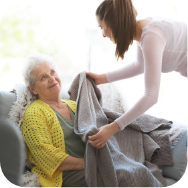How to Communicate with Someone who is Suffering from Dementia

Dementia affects an estimated 47.5 million people worldwide, and a new case of it is diagnosed every 4 seconds. It is a syndrome caused by brain cell death, often as a result of Alzheimer’s disease.
Although we envision dementia patients as the elderly, the affliction is not a normal part of aging. There is no cure for it, nor is there a way to halt its progress. Today, the best we can do is properly take care of people suffering from the syndrome, and that starts with communication.
Communicate Through Simple Speech
Dementia is progressive – it affects a person’s ability to communicate, as well as the ability to remember and process information gradually, with the symptoms becoming worse over time. A person suffering from the symptoms is usually more detached and less communicative.
You should encourage the person with dementia to communicate. Use simple speech while keeping the tone calm and slow, and don’t forget to ask questions that can be answered with a “yes” or a “no”. If your question is not understood or ignored, try asking again, but use simpler words and phrases. Keep it short, too.
Be specific — use names instead of pronouns. Avoid saying, “Hey, it’s me”; instead say, “Hey, it’s Jim, your son.” Focus on one topic at a time.
Always show respect — avoid condescending language, slang, and especially “baby talk”.
Use Body Language
Dementia causes severe disorientation, poor judgment, and the inability to process abstract thought. A person suffering from the affliction may become confused or scared if you aren’t careful in your non-verbal communication, even if that person is your parent or grandparent.
We often talk with our bodies. Our facial expressions, gestures, body postures, and even the way we touch someone and keep our space, are non-verbal forms of communication. Keep your non-verbal cues in mind when talking to your elderly relative with dementia.
Engage the person at his or her level or even below; don’t stand too close, as that may cause the person to feel intimidated. You can gently hold the person’s hand to make them feel at ease.
It’s also important to watch the person’s body language as well, especially since people with dementia have trouble communicating verbally. An individual with dementia may not be able to say that he or she is happy or sad or even scared, but their body language will give you the clues about their emotional state.
Engage in Active Listening
To talk to someone with dementia means learning to listen. Always keep eye contact when listening, and encourage the person to keep eye contact with you. This will help the person focus on the conversation, which is important as people with dementia have a difficult time keeping focused.
Avoid any interruptions or doing other things when talking to someone with dementia; minimize noisy distractions, like the TV or radio, as well.
To actively listen means to show respect. Your grandmother or father or spouse may speak gibberish, and it is up to you be respectful and listen. Don’t try to argue or correct them. Simply listen.
Remember: you can’t truly reason with someone who has dementia.
Be Patient
It can be easy to become frustrated when someone isn’t listening to you, or when you have to repeat yourself, or when someone keeps asking you the same thing. If you become irritated when talking to a person with dementia, then it is best to take a minute or two to calm down – go in the other room or take a walk.
Patience, respect, and the understanding of the effects of the illness are the keys to communicating to someone with dementia. You have to understand that a person with the symptoms of dementia is not fully aware of his or her actions; that person will not know why you are irritated.
You have the luxury of patience, and it is up to you to be kind, calm, and respectful when communicating with someone suffering from dementia.
Arthur Mogilevski

























